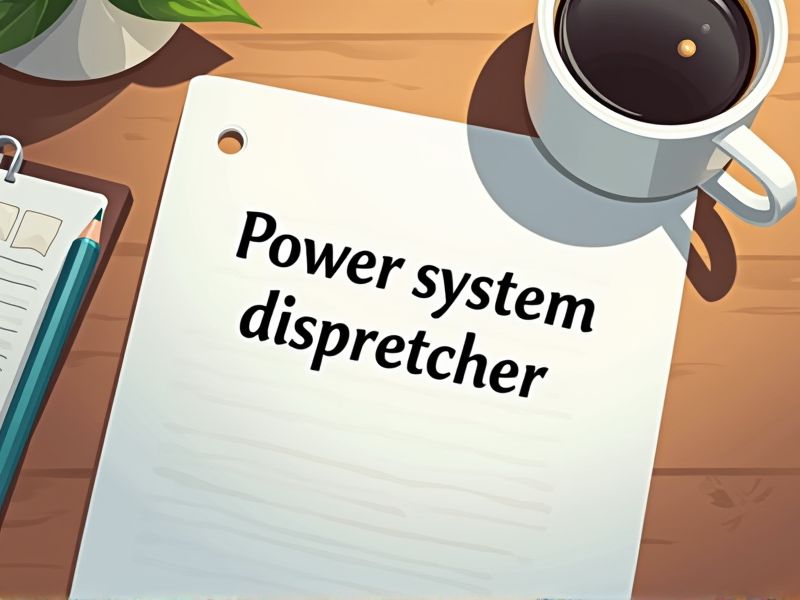
Power system dispatchers are responsible for controlling and managing electricity transmission and distribution to ensure reliability and safety. Certification ensures that dispatchers possess the specialized knowledge and skills required to handle complex systems and prevent disruptions. Regulated industries like energy emphasize certifications to maintain standard operating procedures and compliance with safety regulations. Below are essential certifications that someone might need to work as a Power system dispatcher.
NERC System Operator Certification
Power system dispatchers must achieve the NERC System Operator Certification to meet standards that ensure grid reliability and safety. This certification provides a standardized assessment of their knowledge and skills related to real-time operational decision-making in complex grid environments. Without certified dispatchers, power systems may experience increased risks of blackouts due to operational errors. Regulators and utilities require the certification to maintain compliance with federal and regional energy policies.
NERC CIP Compliance Certification
NERC CIP Compliance Certification ensures power system dispatchers maintain the highest standards of cybersecurity to protect critical infrastructure. Strict adherence to these standards mitigates the risk of cyberattacks that could disrupt power distribution and compromise grid reliability. By certifying dispatchers, the program ensures they possess the necessary knowledge to identify and respond to potential threats effectively. Maintaining NERC compliance demonstrates a commitment to the stability and security of the power grid, fostering stakeholder trust.
Power Systems Dispatcher Certification (PSDC)
Earning a Power Systems Dispatcher Certification demonstrates a dispatcher's proficiency in managing and coordinating electrical grids, which is crucial for maintaining grid stability and preventing blackouts. The certification provides assurance to employers that the dispatcher has met standardized knowledge and skill benchmarks relevant to the power industry. Continuous advancements in technology and complex grid infrastructures necessitate updated training, ensuring the dispatcher can effectively handle modern challenges. Regulatory bodies and industry standards increasingly require certified professionals to adhere to compliance and safety protocols, underlining the importance of the certification.
SCADA Systems Operator Certification
SCADA Systems Operator Certification is crucial for power system dispatchers because it ensures they have the technical expertise to monitor and control complex electrical grids efficiently. Certification guarantees that the dispatcher understands compliance standards and cybersecurity measures essential for maintaining grid integrity. It provides credibility and validation of skills, which is critical for stakeholder trust and operational reliability. The certification process often includes updates on the latest technologies, ensuring that dispatchers stay informed about advancements in SCADA systems.
Electrical Safety Certification (NFPA 70E)
Electrical Safety Certification, such as NFPA 70E, is essential for power system dispatchers because it ensures they have a comprehensive understanding of safety standards, reducing the risks of electrical hazards. This knowledge is crucial for safeguarding not only the dispatchers themselves but also preventing accidents that could affect the operational integrity of power systems. Compliance with NFPA 70E minimizes downtime caused by electrical safety incidents, leading to more efficient and reliable power distribution. Certification also demonstrates the dispatcher's commitment to safety, which is vital for maintaining trust with stakeholders and regulatory authorities.
Certified Energy Manager (CEM)
Certified Energy Managers (CEMs) bring expertise in energy management, which enhances a power system dispatcher's ability to optimize energy distribution efficiently. Their proficiency in analyzing energy data and trends assists in reducing operational costs and improving the overall reliability of the power grid. CEMs' understanding of energy consumption patterns supports dispatchers in making informed decisions, especially during peak demand periods. By integrating CEM insights, power systems can better meet sustainability goals and regulatory compliance.
Certified Power Quality Professional (CPQP)
Power system dispatchers benefit from being Certified Power Quality Professionals because they gain a deeper understanding of grid stability, enabling them to manage power fluctuations more effectively. Heightened awareness of power quality issues helps in reducing equipment failures and enhancing grid reliability. CPQP certification equips dispatchers with advanced problem-solving skills, aiding in swift resolution of power disturbances. Knowledge of power quality standards and practices leads to improved coordination with other energy sector professionals, ensuring optimal power distribution.
Emergency Management Certification (FEMA)
Emergency Management Certification equips power system dispatchers with the knowledge to effectively manage and respond to unexpected power disruptions, enhancing system reliability. It provides critical insights into risk assessment and disaster recovery planning, ensuring a cohesive approach during crises. Certified dispatchers improve communication with other emergency responders, facilitating quicker restoration of services. Additionally, the certification instills confidence in handling emergencies, which can minimize downtime and safeguard infrastructure.
Project Management Professional (PMP)
The Project Management Professional (PMP) certification equips power system dispatchers with advanced project management skills, enhancing their ability to plan and execute complex energy distribution projects efficiently. This certification ensures that dispatchers can effectively coordinate and communicate with multiple stakeholders, reducing the risk of errors and power outages. With PMP, dispatchers gain tools to better manage project timelines and budgets, crucial in preventing cost overruns and ensuring timely delivery. Earning a PMP credential distinguishes dispatchers as professionals with a proven ability to implement industry best practices, increasing their credibility within the energy sector.
Six Sigma Green Belt Certification
Six Sigma Green Belt Certification equips a power system dispatcher with methodologies to enhance efficiency in operations. Understanding process improvements through this certification can lead to reduced errors in managing complex power grids. The structured problem-solving skills gained help in mitigating risks associated with power failures. Proficiency in data analysis from the certification enables better decision-making for operational excellence.
Summary
When you, as a power system dispatcher, obtain relevant certifications, it often enhances your technical knowledge and skills. This advanced expertise typically leads to improved operational efficiency and decision-making. Employers usually recognize these certifications, which might boost your professional credibility and career prospects. Over time, the industry might see a reduction in errors and more stable power distribution systems.
